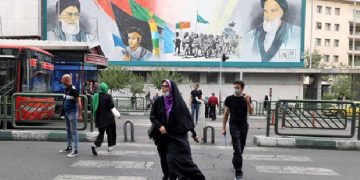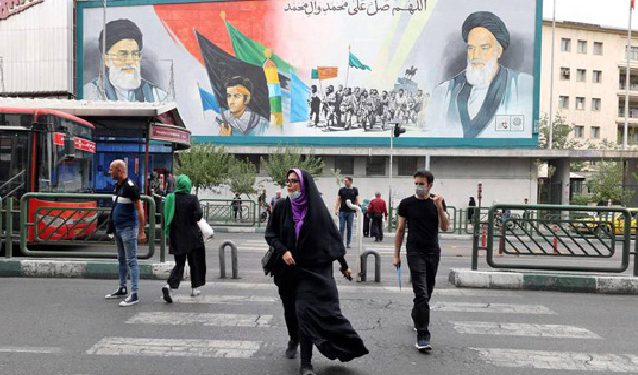The National
Regardless of whether or not the global powers succeed in reviving the Joint Comprehensive Plan of Action (JCPOA) with Iran, western governments involved in the negotiations to rein in the latter’s nuclear weapons programme should examine all possible scenarios and their implications, and not just panic over the prospect of the talks failing. Further, merely hoping that a deal would soften the Iranian regime’s expansionist doctrine and the activities of its Islamic Revolutionary Guard Corps (IRGC) is wishful thinking.
Lately, western powers seem to be eagerly sprinting towards securing an agreement. A faction within the Biden administration in Washington seems desperate for a big foreign policy win. The three European powers involved in the talks – France, Germany and the UK – may be hoping that a deal serves the interests of a continent that is both thirsty for Iranian oil and gas and fearful of Tehran’s nuclear blackmail. There is an assumption in the West that Tehran is no longer a threat to European security – either due to wishful thinking in some European capitals or because backroom dealings are being held with the Iranian regime.
While the revival of the JCPOA will lift sanctions on Iran, it might also empower the IRGC to implement the regime’s doctrine. Recall that this doctrine seeks to undermine comparatively weak Arab states, export Iran’s model to them, and foster paramilitary forces loyal to Tehran that erode Arab sovereignty. Hezbollah in Lebanon is a case in point.
It’s possible that a lack of political consensus in the US on Iran’s nuclear programme will make it difficult for the Biden administration to secure an agreement ahead of the mid-term election in November. Some experts worry that a deal before the election will damage the governing Democratic Party’s prospects. But there are those who feel that a deal could favour the party at the ballot box.
In any case, the Iranian regime, which has demanded the removal of the IRGC from the US terror list, might consider postponing the same in return for an agreement, which it needs in order to revive its economy. But can the Biden administration provide such a guarantee? It’s not improbable. The formula being discussed could separate the IRGC issue the nuclear programme, in a trilateral framework comprised of the US, Europe and Iran. This framework wouldn’t require Russia or China, both of which stand with Iran and would benefit from sanctions being lifted on Tehran anyway. Moreover, the question of the IRGC’s legitimacy is currently not the greatest obstacle to a deal. It is the issue of the world’s inability to monitor Iran’s nuclear programme, which has led to serious disagreements between Tehran and the International Atomic Energy Agency.
Let’s say, for the sake of argument, that cutting a deal is necessary to prevent Tehran from developing nuclear weapons, and to avoid a confrontation between Iran and Israel. Let’s say there are hidden benefits to international and regional understandings that gradually open a new chapter in Iran’s behaviour and security alignments. What, then, would be the safeguards that should be considered or adopted in order to avoid the negative repercussions of a deal in the region, and to preserve American and European strategic ties with the Arab world – especially given China and Russia’s strategic alignments with Iran? In what areas should the concerned parties be vigilant to avoid repeating the mistakes of the past? And could the prospective deal become a tool with which Iran destroys the sovereignty of Iraq, Syria and Lebanon?
Creative language may be used to address the issue of IRGC’s designation, to avoid obstruction, for example by condemning its past actions while expressing hope for its better behaviour in the future. An alleged Iranian plot, uncovered recently, to assassinate former US president Donald Trump’s national security adviser John Bolton could be deemed as one of its “past actions”. The Europeans, meanwhile, believe Iranian-inspired terror plots on their soil have ceased, and they could insist on the preservation of the status quo.
However, they should also apply pressure on Iran’s activities in the Arab world. If this isn’t a matter of priority for the West, then it should remember that Europe is separated from the Arab region only by the Mediterranean Sea, a route that illegal immigrants continue to use to reach the continent. It is, therefore, in its interest to be alert to the Middle East’s security challenges.
Moreover, Europe has a number of tools it can use to influence Iran’s behaviour. There are economic tools, including Iran’s reliance on European technology and on the continent’s companies to make a recovery; as well as Iran’s desperate need to reintegrate itself with the global economy. As fantastical as it sounds, there may be those in Europe who think that a deal that could avert an energy crisis might also encourage Tehran to pivot to the West.
In return, the West may hope a deal leads to stable Israel-Iran relations; the expansion of the Abraham Accords, and finally, a new security architecture in the Middle East that will help resolve several regional disputes.
Take Lebanon, for example, which faces economic turmoil, threats to its sovereignty, challenges to judicial independence, and an inability to invest in its own hydrocarbon resources.
The first step towards addressing the country’s myriad challenges must be to resolve the issue of the demarcation of its maritime borders with Israel. Iran is not currently hindering this process, but its proxy, Hezbollah, has entered the fray through making threats, deploying drones and inserting the “resistance” as a party to oil and gas exploration and extraction. Perhaps this is “a good cop, bad cop” routine from Tehran and Hezbollah, but those seeking the nuclear deal must secure a guarantee from Iran that lifting of sanctions against it will not fuel Hezbollah’s domination over the Lebanese state.
There are other instruments leverage over Iran that are available to western capitals, if these countries are truly honest in their stated concern for Lebanon’s independence. And although the country’s politicians are indeed responsible for its economic collapse, the upcoming phase of events requires the major powers to cease blaming the Lebanese people exclusively for their problems. They have a major responsibility on their shoulders to protect Lebanon and other vulnerable Arab nations from the repercussions of a deal with Iran.
The US and Europe, in particular, need to ensure that their regional objectives are translated into policy implemented with a set of rules and the threat of consequences for those who flout it. Otherwise, the wider world – and not just the region – is likely pay a heavy price down the road.





